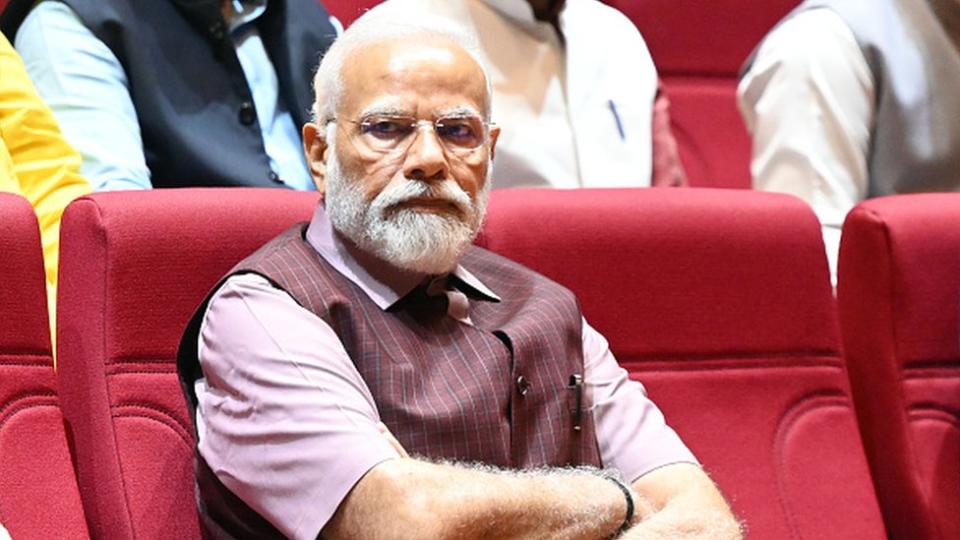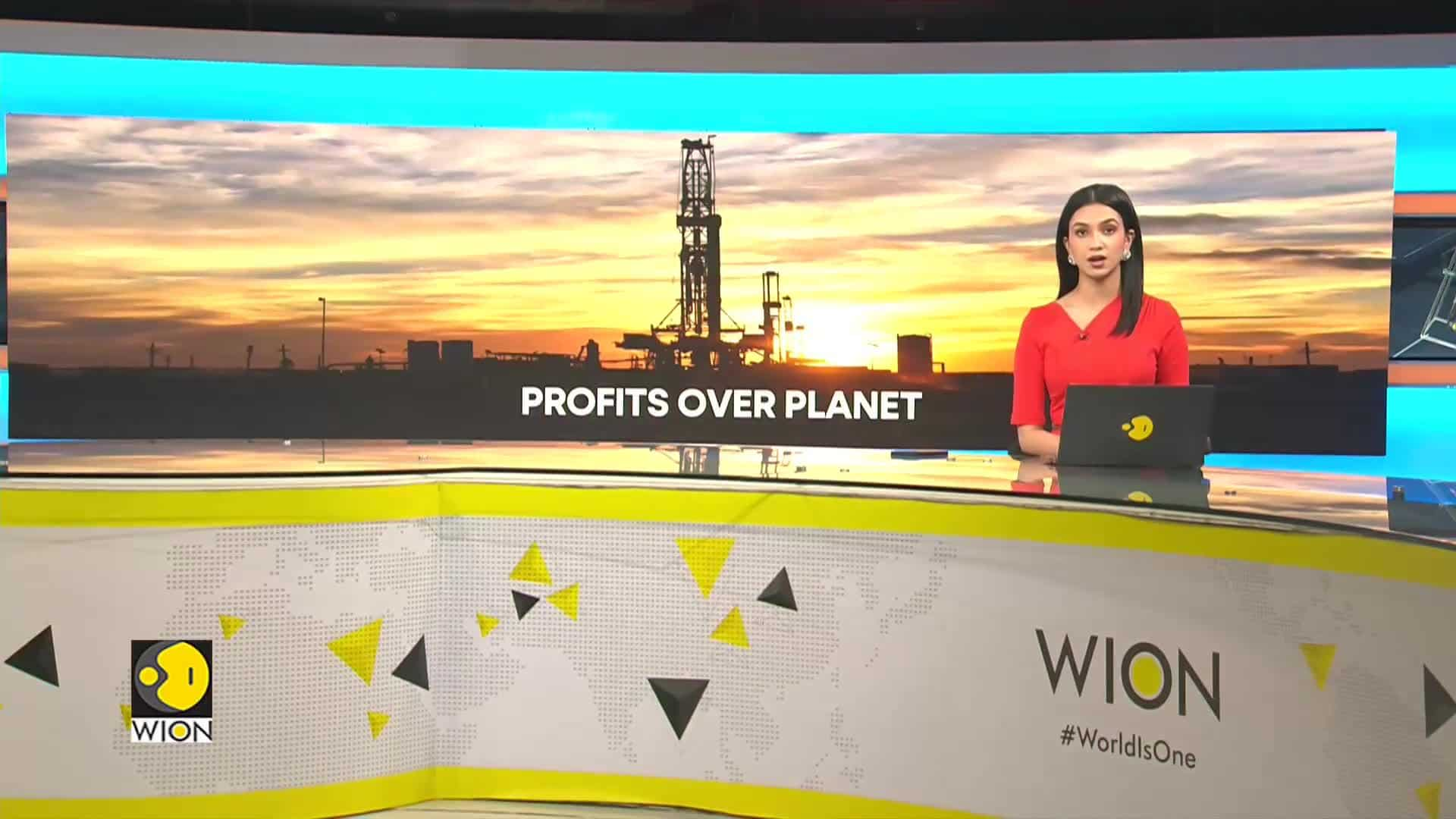Krishn Kaushik
Fri, July 28, 2023
Heavily armed rival groups firing at each other from bunkers
*
Nearly three months later, no sign of resolution to conflict
*
Embarrassment for Modi as he prepares for G20 summit
*
Government to face no-confidence motion over violence
*
State government, police accused of bias
KANGVAI, India, July 28 (Reuters) - A one-mile stretch of a highway in the lush green foothills of India's Manipur state has become the symbol of a vicious sectarian conflict that has killed over 180 people since May and severely dented the strongman image of Prime Minister Narendra Modi.
The bitter fighting between the Meitei community and the Kuki tribals is in the remote northeast of the country but it has lasted for almost three months, a deep embarrassment for Modi as he prepares to host a summit of G20 leaders in September and contest a general election next year.
There have been past tensions between the two groups, but violence erupted in early May after the state high court ordered the government to consider extending economic benefits reserved for the Kuki tribals to the Meiteis.
Street protests spiralled into armed conflict and now, rival gunmen have dug into bunkers and outposts along the highway and in other places in Manipur, and regularly fire at each other with assault weapons, sniper rifles and pistols.
Tens of thousands of people have fled their homes because of the fighting, villages have been set on fire and many women sexually assaulted, residents and media reports say. The Meitei-dominated state police are seen as partisan while army troops have been ordered to keep the peace but not to disarm fighters.
There is no sign of any early resolution.
Historian and author Ramachandra Guha described the situation as "a mixture of anarchy and civil war and a complete breakdown of the state administration".
"It is a failure of the prime minister at a time of grave national crisis," Guha added, speaking in a television interview. "Narendra Modi lives in a bubble of his own, he doesn't like to be associated with bad news and somehow hopes he will ride it out."
The prime minister's office and a state government spokesman did not respond to requests for comment.
The Kukis, who are a third of the Meitei population, have borne a disproportionate brunt of the violence and make up two-thirds of the victims, according to new government data reviewed by Reuters this week. They have mostly fled to the hills, leaving the capital Imphal and the surrounding valley, areas dominated by the majority Meiteis.
Much of the violence and killings have taken place in buffer zones near Manipur's foothills where intense gun battles erupt regularly, security officials said.
The stretch of the national highway where the Meitei-dominated Bishnupur district meets Kuki-controlled Churachandpur is one of the buffer zones that has seen some of the worst fighting.
MODI'S COMMENTS
This week, when a Reuters team visited the Kuki village of Kangvai, just off the highway, volleys of gunshots could be heard from both sides.
Jangminlun Touthang, 32, a Kuki fighter carrying a hunting rifle, was manning a post directly opposite the Meitei lines.
He said he was there to protect his village from the Meiteis "who are going to attack us, who are going to burn our houses".
"When they attack, we fire," he said.
Modi's first comments on the violence in Manipur came last week, over two months after the trouble started in early May. He promised tough action a day after videos that purported to show two Kuki women being paraded naked and assaulted by a crowd went viral and drew international condemnation.
"The law will take its strongest steps, with all its might. What happened to the daughters of Manipur can never be forgiven," he said.
Modi's Bharatiya Janata Party (BJP) also heads the state government in Manipur. In the federal parliament, Modi faces a no-confidence motion over the violence, the second time in over nine years in power that he has been put to the test.
Although there is no threat to his government, Modi is likely to have to address the issue in detail.
The opposition is likely to ask why he is persisting with support to Manipur Chief Minister Biren Singh, a Meitei who heads the BJP state government.
Manipur, which borders Myanmar, is one of India's smallest states with a population of 3.2 million. While Kukis are just 16% of the state's population, Meiteis make up 53% of the people.
The death toll of 181 killed includes 113 Kukis and 62 Meiteis, according to the data reviewed by Reuters that have not been reported earlier.
The data show that in the first week of the violence in early May, 77 Kukis were killed compared to 10 Meiteis.
“Resources available to both sides are not the same. It is not a fight among equals,” a federal security official based in Manipur told Reuters.
According to government estimates, 2,780 weapons stolen from the state armoury, including assault rifles, sniper guns and pistols, remain with the Meiteis, while the Kukis have 156.
Kae Haopu Gangte, general secretary of Kuki Inpi Manipur, an umbrella Kuki civil society group, blamed the conflict on what he said was the desire of the Meiteis to dominate Kuki land.
The Kukis now want a separate state within India, he said.
“Until and unless we achieve statehood we will not stop,” Gangte said. “We are fighting not only Meiteis, we are fighting the government.”
Pramot Singh, founder of Meitei Leepun, a prominent Meitei organization that has members on the frontlines, said all Meiteis supported the conflict.
Seated outside his home near Imphal, with a pistol in a holster, he said his group will fight the Kukis until they stop demanding a separate state be carved out of Manipur.
“The war will continue from the Meitei side. This is just the beginning,” he said.
(Reporting by Krishn Kaushik in Manipur; Editing by YP Rajesh and Raju Gopalakrishnan)
India's Parliament rocked by protests for a third day over ethnic violence in remote state
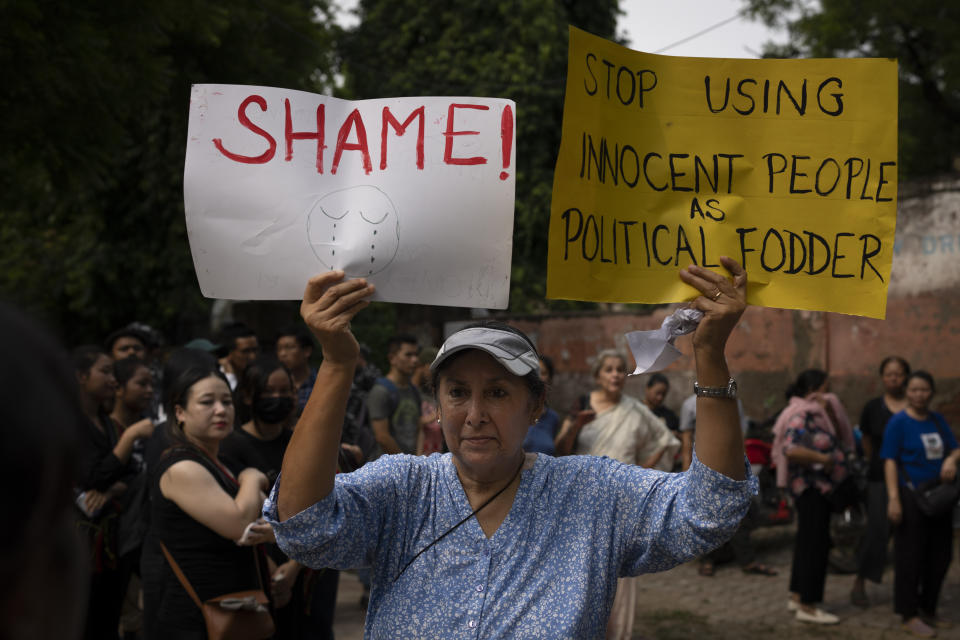
A woman holds placards during a protest demonstration against the violence in the northeastern state of Manipur, in New Delhi, India, Friday, July, 21, 2023. Deadly ethnic clashes in India's northeast rocked India's Parliament with the opposition blocking proceedings for a second straight day on Friday demanding the sacking of the top elected official of northeastern Manipur state where ethnic clashes have left more than 130 people dead since early May.
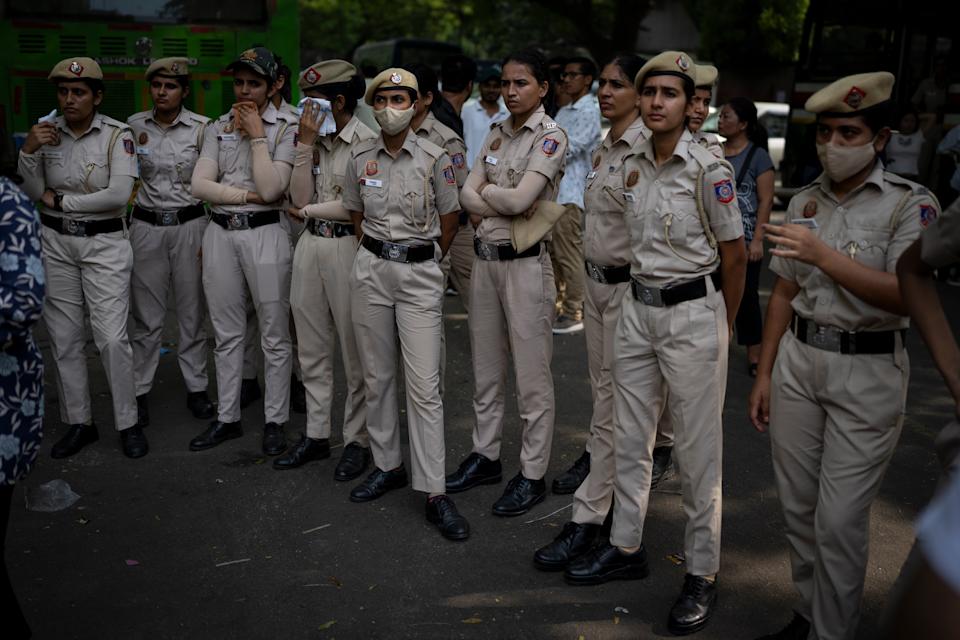
Policewomen stand guard during a protest demonstration against the violence in the northeastern state of Manipur, in New Delhi, India, Friday, July, 21, 2023. Deadly ethnic clashes in India's northeast rocked India's Parliament with the opposition blocking proceedings for a second straight day on Friday demanding the sacking of the top elected official of northeastern Manipur state where ethnic clashes have left more than 130 people dead since early May.
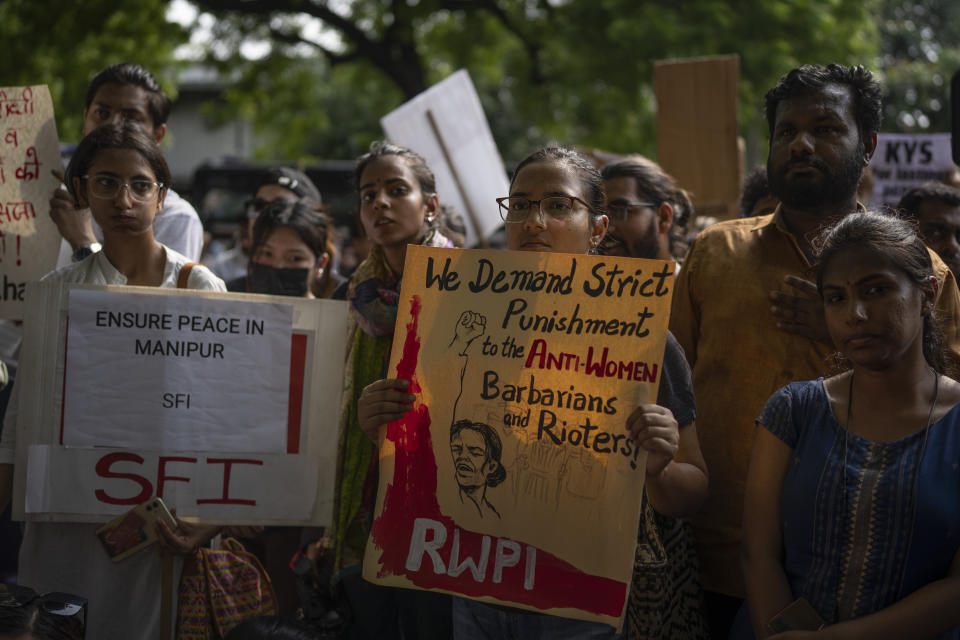
Students and activists participate in a protest demonstration against the violence in the northeastern Indian state of Manipur, in New Delhi, India, Friday, July, 21, 2023. Deadly ethnic clashes in India's northeast rocked India's Parliament with the opposition blocking proceedings for a second straight day on Friday demanding the sacking of the top elected official of northeastern Manipur state where ethnic clashes have left more than 130 people dead since early May.
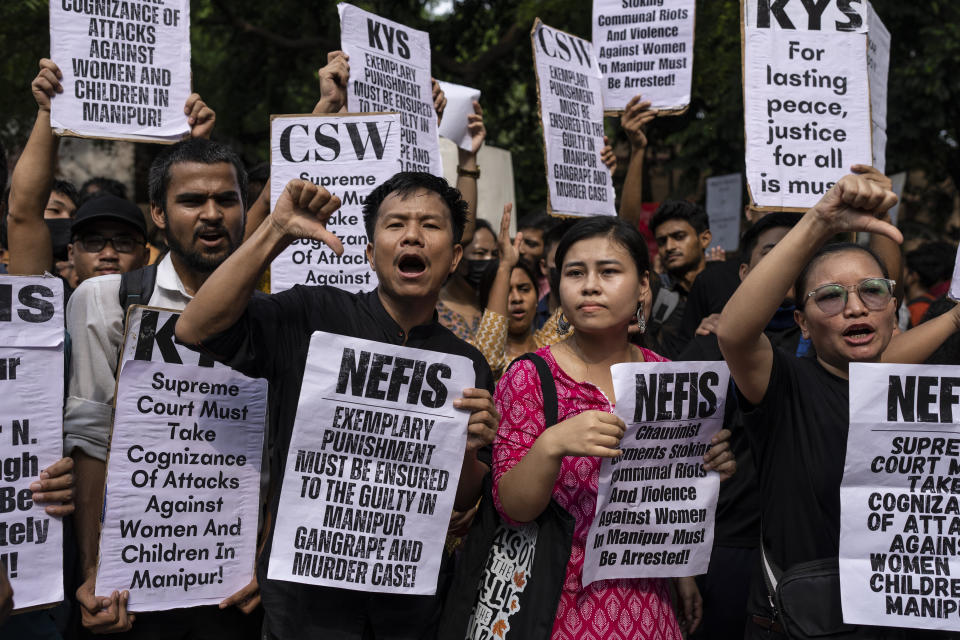
Students and activists shout slogans during a protest demonstration against the violence in the northeastern Indian state of Manipur, in New Delhi, India, Friday, July, 21, 2023. Deadly ethnic clashes in India's northeast rocked India's Parliament with the opposition blocking proceedings for a second straight day on Friday demanding the sacking of the top elected official of northeastern Manipur state where ethnic clashes have left more than 130 people dead since early May.

Students and activists shout slogans during a protest demonstration against the violence in the northeastern Indian state of Manipur, in New Delhi, India, Friday, July, 21, 2023. Deadly ethnic clashes in India's northeast rocked India's Parliament with the opposition blocking proceedings for a second straight day on Friday demanding the sacking of the top elected official of northeastern Manipur state where ethnic clashes have left more than 130 people dead since early May.
Mon, July 24, 2023
NEW DELHI (AP) — India's Parliament was disrupted for a third day Monday by opposition protests over ethnic clashes in a remote northeastern state in which more than 130 people have been killed since May.
Opposition lawmakers carried placards and chanted slogans outside the Parliament building as they demanded a statement from Prime Minister Narendra Modi on the violence in Manipur state before a debate on the issue.
Last week, Modi broke more than two months of public silence over the ethnic clashes, telling reporters that mob assaults on two women who were paraded naked were unforgivable, but he did not refer directly to the larger violence.
His comments came after a video showing the assaults sparked widespread outrage on social media despite the internet being largely blocked and journalists being locked out in the state. It shows two naked women surrounded by scores of young men who grope their genitals and drag them to a field.
The video was emblematic of the near-civil war in Manipur, where mobs have rampaged through villages and torched houses. The conflict was sparked by an affirmative action controversy in which Christian Kukis protested a demand by mostly Hindu Meiteis for a special status that would let them buy land in the hills populated by Kukis and other tribal groups and get a share of government jobs.
Indian Home Minister Amit Shah on Monday said the government is ready to discuss the situation in Manipur. "I request the opposition to let a discussion take place on this issue. It is important that the country gets to know the truth on this sensitive matter,” he said in the lower house of Parliament.
Both houses of Parliament were adjourned various times as the opposition stopped proceedings with their demand for a statement from Modi. Sessions were also disrupted on Thursday and Friday.
The main opposition Congress party's president, Mallikarjun Kharge, tweeted it was Modi's “duty to make a comprehensive statement inside the Parliament on Manipur violence.”
Violence in Manipur and the harrowing video have triggered protests across the country. On Monday, scores of people gathered in Indian-controlled Kashmir and protesters carrying placards took to the streets of the eastern city of Kolkata.
Over the weekend, nearly 15,000 people held a sit-in protest in Manipur to press for the immediate arrest of anyone involved in the assault, which occurred in May. They also called for the firing of Biren Singh, the top elected official in the state who also belongs to Modi's party.
The state government said last week that four suspects had been arrested and that police were carrying out raids to arrest other suspects.
